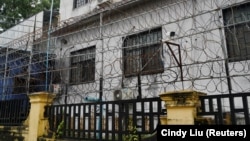A growing and troubling trend, highlighted in the latest U.S. Trafficking in Persons Report, is that of forced labor initiated and conducted in cyber-scam operations.
Cindy Dyer, U.S. Ambassador-at-Large to Monitor and Combat Trafficking in Persons, noted, “Traffickers have leveraged pandemic-related economic hardships, increased global youth unemployment, and international travel restrictions to exploit thousands of adults and children in a multi-billion-dollar industry over the last two years:”
“Many people have responded to job offers for what they think are work in IT [Information Technology], casinos, or other seemingly legitimate businesses. Often, these individuals are forced to participate in cyber-scams under impossible quota arrangements that make them increasingly indebted to traffickers. Traffickers use this debt to exploit victims in forced labor and sex trafficking, including in special economic zones, primarily throughout Southeast Asia, but ensnaring individuals from at least 35 countries and territories.”
In Southeast Asia, cyber-scam operations have been found in Burma, Cambodia, Laos, Malaysia, and the Philippines.
The U.S. government is determined to combat this crime.
“First of all, we are encouraging governments and authorities to prioritize proactively identifying and assisting victims. … We are also dedicating foreign assistance to build capacity in the region to address this growing trafficking problem. … Another thing that we are doing is flagging that, frequently, survivors, who are able to escape from these situations of trafficking, are often met with administrative, criminal charges, or immigration violations once they are actually released. And so, we want to encourage governments not to penalize these individuals who have been forced to engage in cyber-crime operations.”
Ambassador Dyer praised several governments “really doing a good job” in the Asia-Pacific: Taiwan, which has increased efforts to screen for victims and provide immunity in cases of forced criminality; Laos, which is cooperating with international authorities to recover Lao victims from the Golden Triangle Special Economic Zone; and Hong Kong, which has created a web-based application for victims and families to report cases of cyber-scam operations.
Additionally, across the Asia-Pacific, Ambassador Dyer noted, there were increases in the number of trafficking victims identified, as well as in the number of traffickers prosecuted and convicted.
“These increases are encouraging,” Ambassador Dyer declared, “but there remains much work to do to address significant human trafficking problems in the region.”






